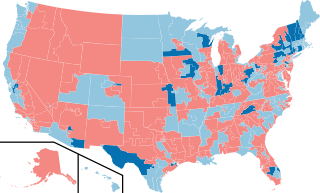| |||||||||||||||||||||||||||||||||||||||||||||||||||||||||||||||||||||||
All 435 seats in the United States House of Representatives[a] 218 seats needed for a majority | |||||||||||||||||||||||||||||||||||||||||||||||||||||||||||||||||||||||
|---|---|---|---|---|---|---|---|---|---|---|---|---|---|---|---|---|---|---|---|---|---|---|---|---|---|---|---|---|---|---|---|---|---|---|---|---|---|---|---|---|---|---|---|---|---|---|---|---|---|---|---|---|---|---|---|---|---|---|---|---|---|---|---|---|---|---|---|---|---|---|---|
| |||||||||||||||||||||||||||||||||||||||||||||||||||||||||||||||||||||||
 Results: Democratic hold Democratic gain Republican hold | |||||||||||||||||||||||||||||||||||||||||||||||||||||||||||||||||||||||
| |||||||||||||||||||||||||||||||||||||||||||||||||||||||||||||||||||||||
The 2006 United States House of Representatives elections were held on November 7, 2006, to elect members to the United States House of Representatives. It took place in the middle of President George W. Bush's second term in office. All 435 seats of the House were up for election. Those elected served in the 110th United States Congress from January 3, 2007, until January 3, 2009. The incumbent majority party, the Republicans, had won majorities in the House consecutively since 1994, and were defeated by the Democrats who won a majority in the chamber, ending 12 years of Republican control in the House.
The Republicans had won a 232-seat majority in 2004, but by the time of the 2006 election, they held 229 seats, while the Democrats held 201, plus 1 Independent (Bernie Sanders) who caucused with the Democrats. There were also four vacancies. Democrats needed to pick up 15 seats to take control of the House, which had been in Republican control since January 1995. Along with the historical "sixth-year itch" that has plagued many incumbent presidents in midterm elections, the public's perception of George W. Bush, the handling of the Iraq War and the War in Afghanistan, and a series of political scandals involving mostly congressional Republicans took their toll on the party at the ballot box.[1]
The final result was a 31-seat pickup for the Democrats, including the pickup of the Vermont at-large seat, previously held by Independent Bernie Sanders (who ran instead for U.S. Senate), who caucused with the Democrats. Democrats defeated 22 Republican incumbents and won eight open Republican-held seats. For the first time since the party's founding, Republicans won no seats previously held by Democrats and defeated no Democratic incumbents.[2] It was the largest seat gain for the Democrats since the 1974 elections. Among the new Democrats were the first Muslim in Congress (Keith Ellison) and the first two Buddhists (Mazie Hirono and Hank Johnson). As a result of the Democratic victory, Nancy Pelosi became the first female and the first Californian House Speaker.[3]
As of 2024, this is the only House election cycle where only one party flipped any seats, the last time Republicans won a House race in Connecticut or more than one House seat in New Mexico, and the last time Democrats won more than one House seat in Kansas. This was also the last time until 2024 that Democrats won more than one House seat in Louisiana.
Several members of the House first elected in 2006 have gone onto National attention, including Gabby Giffords and Michele Bachmann; United States Senators Kirsten Gillibrand, Dean Heller, Mazie Hirono, and Chris Murphy; Senator and Ambassador Joe Donnelly; former Speaker Kevin McCarthy; Minnesota Attorney General Keith Ellison; and Governor and Vice-Presidential candidate Tim Walz.
Cite error: There are <ref group=lower-alpha> tags or {{efn}} templates on this page, but the references will not show without a {{reflist|group=lower-alpha}} template or {{notelist}} template (see the help page).
- ^ "So Why Did the Democrats Win?". Time Magazine. November 15, 2006. Retrieved March 6, 2014.
- ^ Rose, Don (December 26, 2006). "Democratic sweep may be long-lasting". Chicago Tribune. Retrieved April 9, 2014.
- ^ "Democrats win House, promise new direction". CNN. November 8, 2006. Retrieved March 6, 2014.

